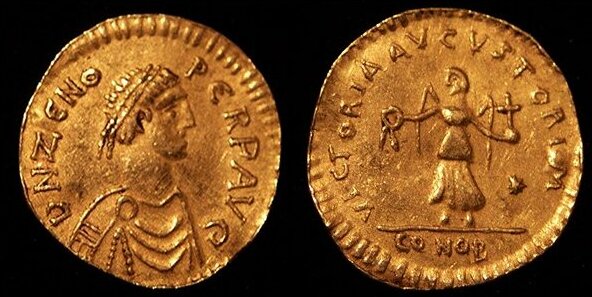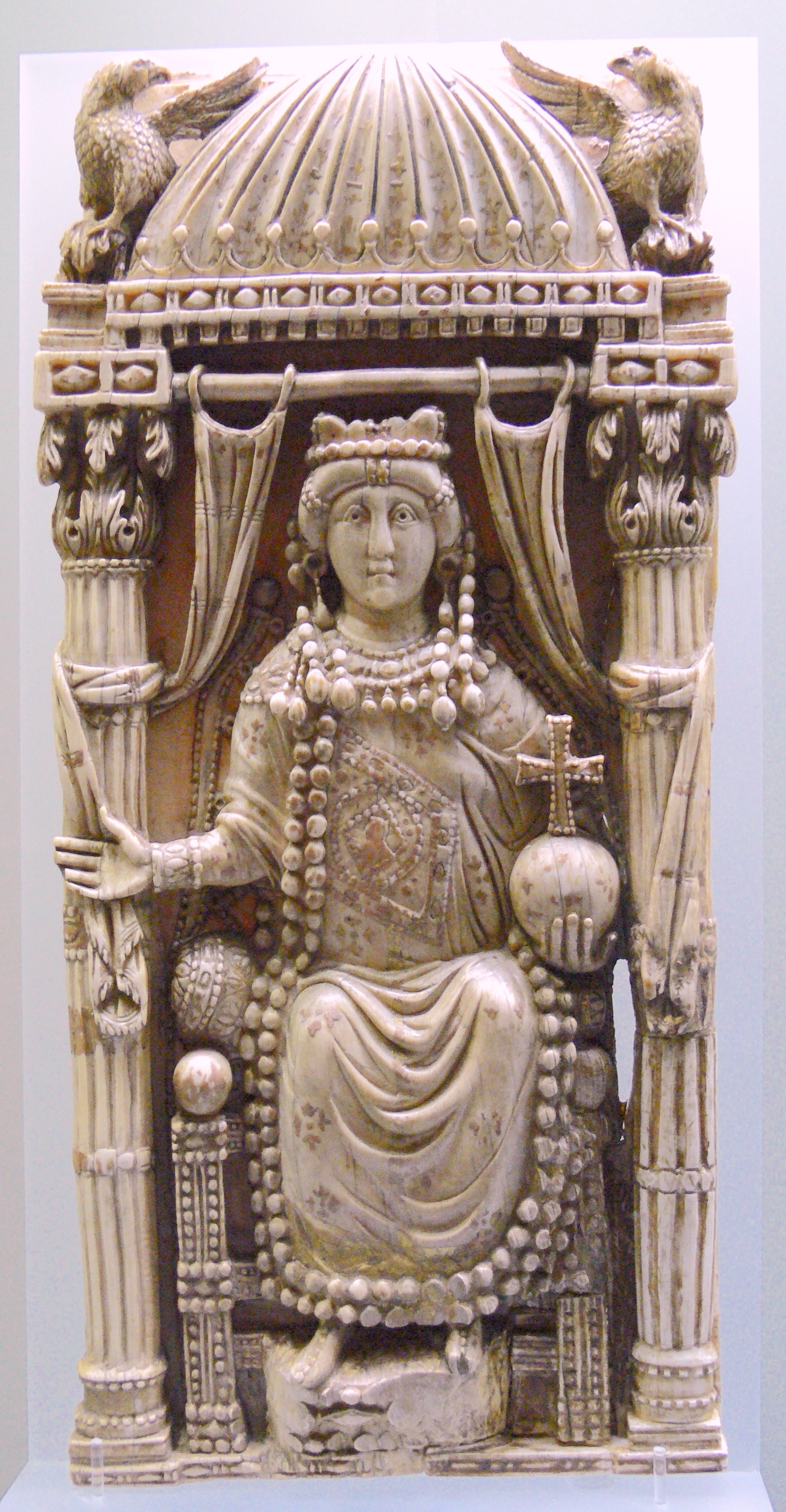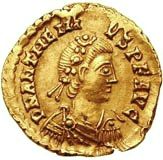|
Illus
Flavius Illus (; died 488) was a Roman general who played an important role in the reigns of the Eastern Emperors Zeno (emperor), Zeno and Basiliscus. Illus supported the revolt of Basiliscus against Zeno and switched sides to support the return of Zeno (475–476). Illus served Zeno well, defeating the usurper Marcianus (son of Anthemius), Marcianus but came into conflict with the Dowager Empress Verina, and supported the revolt of Leontius (usurper), Leontius. The rebellion failed, and Illus was killed. Origins Illus ( or ) was an Isaurian, but the time and place of his birth are unknown; he had a brother, called Flavius Appalius Illus Trocundes, Trocundes. Illus is said to have held various offices under the Emperor Leo I (emperor), Leo I (457–474), and to have been an intimate friend of Zeno, apparently before his accession. John Malalas considered Illus an uncle of Zeno. We first read of him in Zeno's reign, at a time during which he was hostile to Zeno. Under Basilis ... [...More Info...] [...Related Items...] OR: [Wikipedia] [Google] [Baidu] |
Zeno (emperor)
Zeno (; ; – 9 April 491) was Eastern Roman emperor from 474 to 475 and again from 476 to 491. His reign was plagued by domestic revolts and religious dissension, but was more successful on the foreign front. He is credited with further stabilizing the Eastern empire, while the Western Roman Empire fell following the deposition of Romulus Augustulus. Born in Isauria, Zeno was known as Tarasis before adopting his Greek name and becoming an ally of Emperor Leo I (emperor), Leo I, who saw the Isaurian general as an important counterweight against the Germanic leader Aspar. In 466, he married Leo I's daughter, Ariadne (empress), Ariadne, with whom he had a son, Leo II (emperor), Leo. On the death of Leo I in 474, Zeno's seven-year-old son took the throne as Leo II, with Zeno made co-emperor shortly after. Leo II died of an illness later that year, leaving Zeno as the sole emperor. Despite his early success in making peace with the Vandals, Zeno was an unpopular emperor due to his ... [...More Info...] [...Related Items...] OR: [Wikipedia] [Google] [Baidu] |
Pamprepius
Pamprepius (, ''Pamprépios''; Latin: ''Pamprepius''; 29 September 440 – November 484) was a philosopher and a pagan poet who rebelled against the Eastern Roman Emperor Zeno (emperor), Zeno. Damascius described him as a brilliant poet, Malchus (historian), Malchus as an acute politician, but ugly, arrogant, unscrupulous and treacherous. Rhetorius, an Egypt, Egyptian astrologer, called him a charlatan and a libertine. He has been compared to Claudian, as both these poets enjoyed eight years of political power at the side of usurpers. He is considered the last Roman pagan poet. His life is known with unusual precision, as his horoscope calculated by Rhetorius in the early sixth century has been found. Biography Education Pamprepius was born in Egypt, at Panopolis, near Thebes, Egypt, Thebes, on 29 September 440; the discovery of a horoscope, which has been identified with that of Pamprepius, let us know that he was born at 15:48. He was ugly, but he had considerable intell ... [...More Info...] [...Related Items...] OR: [Wikipedia] [Google] [Baidu] |
Verina
Aelia Verina (Greek: Βερίνα; died 484) was the Eastern Roman empress as the wife of Leo I. She was a sister of Emperor Basiliscus. Her daughter Ariadne also became empress. Verina was the maternal grandmother of Leo II. Family The origins of Verina and her brother Basiliscus are unknown. They are considered likely to have ancestry in the Balkans but nothing more specific is known. They are assumed to have at least one sister as a hagiography of Daniel the Stylite names a brother-in-law of Verina and Basiliscus as Zuzus. Stefan Krautschick in his historical work ''Zwei Aspekte des Jahres 476'' (1986) advanced a theory that the two siblings were related to Odoacer, the first barbarian King of Italy.Patrick Amory, ''Passage of "People and Identity in Ostrogothic Italy, 489-554" (2003)], page 282 The theory relies on passage 209.1 in the fragmentary chronicle of John of Antioch (chronicler), John of Antioch, a 7th-century monk. The chronicler has been tentatively identifie ... [...More Info...] [...Related Items...] OR: [Wikipedia] [Google] [Baidu] |
Flavius Appalius Illus Trocundes
Flavius Appalius Illus Trocundes (Greek: Τρόκονδος, died 485) was a general of the Eastern Roman Empire, involved in the rise and fall of Emperor Basiliscus and the rebellion against Emperor Zeno. Trocundes was the brother of Illus, another Roman general. Both of them were from the region of Isauria. Biography Support and betrayal of Basiliscus In 475, the Eastern Roman Emperor Zeno, successor of Emperor Leo I, was deposed by Basiliscus, the brother of Leo's widow Verina. Zeno, expelled from Constantinople, fled to the mountains of Isauria, his home country. Basiliscus sent to chase him two of his generals, the brothers Trocundes and Illus, who were both of Isaurian origin. They defeated the ex-Emperor in July 476, and blocked him on a hill called "Constantinople" by local populations. While Illus and Trocundes besieged Zeno, Basiliscus was losing the support of the aristocracy and the Church in the capital because of his religious position; he also lost Illus and Tr ... [...More Info...] [...Related Items...] OR: [Wikipedia] [Google] [Baidu] |
Basiliscus
Basiliscus (; died 476/477) was Eastern Roman emperor from 9 January 475 to August 476. He became in 464, under his brother-in-law, Emperor Leo I (457–474). Basiliscus commanded the army for an invasion of the Vandal Kingdom in 468, which was defeated at the Battle of Cape Bon. There were accusations at the time that Basiliscus was bribed by Aspar, the ; many historians dismiss this, instead concluding that Basiliscus was either incompetent or foolish for accepting Vandal King Gaiseric's offer of a truce, which the latter used to construct fireships. Basiliscus's defeat cost the Eastern Empire of gold, causing the empire to hover above bankruptcy for 30 years. When Basiliscus returned to Constantinople, he sought refuge in the Hagia Sophia. His sister, Empress Verina, secured him a pardon and he left the church to retire in Neapolis. When Emperor Leo died in 474, his grandson Leo II (474) took power, but soon died; his father, Zeno (474–475, 476–491) ascended th ... [...More Info...] [...Related Items...] OR: [Wikipedia] [Google] [Baidu] |
Marcianus (son Of Anthemius)
Flavius Marcianus (Ancient Greek, Greek: Μαρκιανός, AD 469–484) was a member of the Leonid dynasty. The son of the Western emperor Anthemius, Marcianus married Leontia (daughter of Leo I), Leontia, the daughter of the Eastern Roman emperor Leo I (emperor), Leo I. He was consul twice, and in 479 unsuccessfully attempted to overthrow the emperor Zeno (emperor), Zeno. After his capture he was forced to become a monk; he escaped and raised an army but was defeated and recaptured by Flavius Appalius Illus Trocundes. In 484, when the Isaurian general Illus revolted against Zeno, Marcianus was freed and Illus proclaimed him emperor, before deposing him in favour of Leontius (usurper), Leontius. Biography Marcianus was a member of several Roman imperial families. His father was Anthemius, Western Roman emperor between 467 and 472, who descended from Procopius (usurper), Procopius, usurper in 365–366 against Emperor Valens and relative of Emperor Julian (emperor), Julian ... [...More Info...] [...Related Items...] OR: [Wikipedia] [Google] [Baidu] |
Leontius (usurper)
Leontius (; died 488) was a general of the Eastern Roman Empire and claimant to the throne who led a rebellion against Emperor Zeno in 484–488. Biography Leontius was of Syrian or Isaurian origin, coming from Dalisandus (Isauria), Dalisandus. Under Zeno (emperor), Zeno he became ''magister militum per Thracias'' (Commander-in-chief of the Imperial army in Thrace). In 484, the Roman general Illus broke off his relationship with Emperor Zeno. The emperor sent Leontius with an army against Illus, but Illus managed to persuade Leontius to go over to his side. Zeno was not popular with the people of Constantinople, a crucial part of Eastern Roman politics, because he was an Isaurian (although he might just as well have been Syrian as Theophanes the Confessor, Theophanes points out directly) and as such he was considered a barbarian (which is why he had suffered an usurpation in 475/476 by Basiliscus); Illus, who also was an Isaurian, decided not to take it for himself but to rais ... [...More Info...] [...Related Items...] OR: [Wikipedia] [Google] [Baidu] |
Constantinople
Constantinople (#Names of Constantinople, see other names) was a historical city located on the Bosporus that served as the capital of the Roman Empire, Roman, Byzantine Empire, Byzantine, Latin Empire, Latin, and Ottoman Empire, Ottoman empires between its consecration in 330 until 1930, when it was renamed to Istanbul. Initially as New Rome, Constantinople was founded in 324 during the reign of Constantine the Great on the site of the existing settlement of Byzantium, and shortly thereafter in 330 became the capital of the Roman Empire. Following the collapse of the Western Roman Empire in the late 5th century, Constantinople remained the capital of the Eastern Roman Empire (also known as the Byzantine Empire; 330–1204 and 1261–1453), the Latin Empire (1204–1261), and the Ottoman Empire (1453–1922). Following the Turkish War of Independence, the Turkish capital then moved to Ankara. Although the city had been known as Istanbul since 1453, it was officially renamed as Is ... [...More Info...] [...Related Items...] OR: [Wikipedia] [Google] [Baidu] |
Longinus (consul 486)
Flavius Longinus ( Greek: Λογγῖνος; fl. 475–491) was a politician of the Eastern Roman Empire, brother of Emperor Zeno and twice consul (in 486 and 490). Biography Longinus came from the region of Isauria, in Asia Minor. His father was called Kodisa (as attested by his brother's patronimic "Tarasicodissa"), his mother was Lallis or Lalis, his wife was a Valeria and he had a daughter called Longina. When his brother, the Emperor Zeno, was deposed by Basiliscus and pursued by the Imperial army in Isauria (475), Longinus was captured by the Isaurian general Illus and held prisoner for a decade. Illus, who had been a supporter of Basiliscus but later had passed on Zeno's side, used Longinus to keep Zeno under control. In 483, when Zeno requested Longinus' liberation, Illus refused and started the rebellion that led to his death. On the death of Zeno in 491, Longinus was one of the possible candidates for the succession, but his Isaurian origin, which had already cause ... [...More Info...] [...Related Items...] OR: [Wikipedia] [Google] [Baidu] |
Armatus
Flavius Armatus (died 477), also known as Harmatius, was an Eastern Roman military commander, ''magister militum'' under Emperors Leo I, Basiliscus and Zeno, and consul. He was instrumental in the rebellion of Basiliscus against Zeno, and in his subsequent fall. Origin and early career Armatus was a nephew of Basiliscus and of Empress Verina, the wife of Leo I. It is known that Armatus had a son, also named Basiliscus. During the last part of Emperor Leo's reign, Armatus, as ''magister militum per Thracias'', successfully quelled a revolt in Thrace, cutting off the hands of the Thracian prisoners and sending them to the rebels. It is possible that the rebels were men of the Thracian Goth Theodoric Strabo, a military commander under Leo, and hence this revolt would have been the one started by Strabo between the death of Aspar (471) and the end of Leo's rule (473).Suda, s.v. ''Ἁρμάτιος''. Rise of Basiliscus Armatus supported the rebellion of Basiliscus in 475, ... [...More Info...] [...Related Items...] OR: [Wikipedia] [Google] [Baidu] |
Anthemius
Procopius Anthemius (; died 11 July 472) was the Western Roman Empire, Western Roman emperor from 467 to 472. Born in the Byzantine Empire, Eastern Roman Empire, Anthemius quickly worked his way up the ranks. He married into the Theodosian dynasty through Marcia Euphemia, daughter of Eastern emperor Marcian. He soon received a significant number of promotions to various posts, and was presumed to be Marcian's planned successor. However, Marcian's sudden death in 457, together with that of Western emperor Avitus, left the imperial succession in the hands of Aspar. He instead appointed Leo I (emperor), Leo, a low-ranking officer, to the Eastern throne, probably out of fear that Anthemius would be too independent. Eventually, this same Leo designated Anthemius as Western emperor in 467, following a two-year interregnum that started in November 465. Anthemius attempted to solve the two primary military challenges facing the remains of the Western Roman Empire: the resurgent Visigoth ... [...More Info...] [...Related Items...] OR: [Wikipedia] [Google] [Baidu] |






